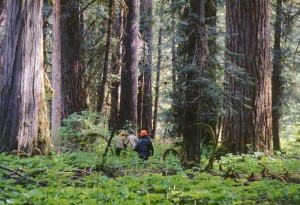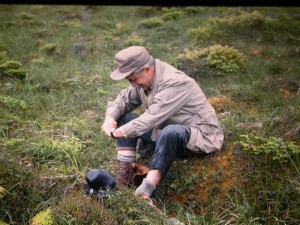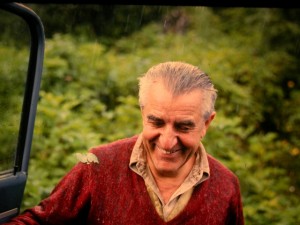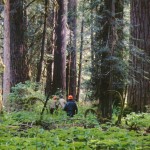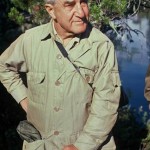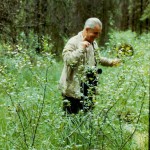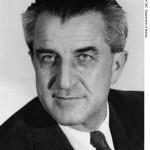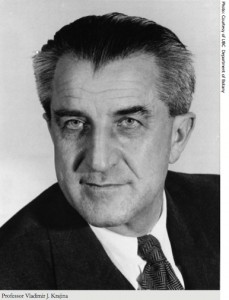
News/Reports
Contributions of Vladimir Krajina to Ecological Reserves in BC
- V.J. Krajina at Haida Gwaii bog
- V.J. Krajina at Haida Gwaii bog
This picture on the left is significant as it was taken by Hans Roemer when Dr. Krajina first visited what later became the Nimpkish Island Ecological Reserve. Hans says ” I took this photograph in June 1974, it shows Dr. Krajina, flanked by two foresters, making his way towards the largest Douglas-fir that then existed on this island (96 m tall, later lost to a Nimpkish River flood).
Also see:
- the file on the History of Ecological Reserves to realize the importance of Dr. Vladimir Krajina in the creation of the Ecological Reserve system in British Columbia.
- the Vladimir Krajina ( Port Chanal) Ecological Reserve # 45
- other postings within the Friends website
Encouraged by the late Dr. Vladimir Krajina ( former professor at the University of British Columbia) and other scientists, the government of BC agreed, in 1968, to form an Ecological Reserves Committee that would advise on the selection of potential reserve sites. A year later, the government formally embarked on setting aside ecological reserves under the Land Act.
The Forests and Vladimir Krajina – a documentary
In 1978 The National Film Board of Canada produced a documentary on the work of Dr. Krajina called The Forests and Vladimir Krajina. Here is a link to the NFB. The film is described as follows:
Description: Visually seductive, this film uncovers a few hard truths under the packaging. Dr. Vladimir Krajina, botanist and teacher, is waging a successful battle in British Columbia for the creation of ecological reserves. He explains the importance of such sanctuaries and why people must know and respect nature’s laws if the future needs of industry and the desire for a high quality of life are to be reconciled. 1978, 29 minutes.
Directed by Tom Radford. Produced by Andy Thomson.
The following are Images captured from the Production
- Vladimir Krajina photo by Jim Pojar
- Vladimir Krajina photo by Jim Pojar
A tribute written by Barbara J. Coupe
Barbara J. Coupe has written a tribute to Dr. Krajina based on the research she conducted for her master’s thesis on the Ecologists of the BC Forest Service’s BEC program. “Although Dr. Vladimir Josef Krajina (1905-1993) has been gone for 18 years, his influence is still being felt in BC forestry. What follows is a personal musing on the legacies of this world-renowned botanist/ecologist. As the developer of the biogeoclimatic concept, Dr. Krajina is front and centre in my thesis. His story is legendary in scope. As the following essay shows, his life not only affected forestry, but also touched people in unexpected ways. Please forgive the inclusion of the references—the academic in me insisted that I include them!”
“Nazis, communists, and forest ecology—this tale of ecological classification in British Columbia involves desperation, intrigue, and landscape. The story stretches back to the tumult of the 1940s, builds with the environmental fervour of the 1970s, and chronicles the evolution of field ecology in the province…..”
For the complete story see the BC Forest History Newsletter Spring/Summer 2011, www.fhabc.org/newsletter-archive/2011/91-92.pdf.
The Records of British Columbia’s Ecological Reserves:
To see the complete article click here http://www.davidsonia.org/files/16_2_eco_records.pdf.
Abstract
This article introduces several archival concepts and principles, and relates them to botanical records, specifically those of the late Professor Vladimir J. Krajina. It is important to create more public awareness of British Columbia’s Ecological Reserves and the learning potential that is inherent in these sites, as well as in Krajina’s records. The records are a source of potential learning, through a web exhibit or public exhibit, which will remind the public of the value of protecting environmental space for learning opportunities and for the protection of species.
From the FALL 1993 issue of the Log, the following is a tribute to Dr. Krajina (Prepared with the assistance of Adolf Ceska)
Dr. Vladimir Krajina—In Memoriam
Dr. Vladimir Krajina, an eminent ecologist and Canadian, died on June 1, 1993, in Vancouver, at the age of 88. Dr. Krajina was the proponent of British Columbia’s ecological reserve program and the creator of its biogeoclimatic classification system.
Vladimir Krajina was born on January 30, 1905 in Slavice, near Trebic, Czech Republic. After obtaining his doctorate at Charles University in Prague (1927), Krajina undertook studies of plant communities in the Mlynica Valley, in the Tatry Mountains. In 1934 he was appointed associate professor of plant systematics at Charles University. World War II interrupted all university programs in the country. Dr Krajina became a leader of the Czech resistance movement. He established radio contact with the exiled Czech government in England and supplied the allied forces with valuable intelligence until his capture in 1943. He barely escaped execution at the hands of the Nazis.
After the war, Dr. Krajina was appointed full professor and head of the geobotany department at Charles University. He became secretary general of the National Socialist Party, the official opposition in the Czech Republic. When the Communist Party destabilized Czechoslovakia in February 1948, Krajina was forced to flee the country. He was tried in absentia and sentenced to 25 years in prison.
A political refugee in Canada, Dr. Krajina was appointed special lecturer in the department of botany at the University of British Columbia in 1949. In 1958, he was made full professor. After retiring in 1973, Dr. Krajina continued his scientific work as professor emeritus. Among the awards and honours he received were the George Lawson Medal, from the Canadian Botanical Association (1972), the Order of Canada (1981), and the Order of the White Lion from the Czech Republic (1990). Issue 64 of the Czech Botanical Society journal Preslia, dedicated to Dr. Krajina, contains a comprehensive botanical bibliography.
For some 40 years, Dr. Krajina and his many students investigated the botanical diversity of the province, systematizing the relationship between plant communities, soils and climatic regimes into the biogeoclimatic zones that are today the foundation for any regional natural history study. More significantly, Krajina’s biogeoclimatic classification has provided the framework for ecologically-sound forest management practices in BC.
In the cause of natural area conservation, Dr. Krajina employed his considerable political skills to obtain passage of the Ecological Reserve Act by the BC Legislative Assembly in 1971, based on the principles established by the International Biological Program. His oft-stated goal for the program was to protect one per cent of BC’s land area in ecological reserves. The 131 reserves created to date protect some 160,000 hectares, of which one-third are marine areas. In over 20 years, we have realised little more than one-tenth of Dr. Krajina’s conservation vision.
Prepared with the assistance of Adolf Ceska
A more detailed version appears in the BC Forest Archive from Biological Electronic Newsletter
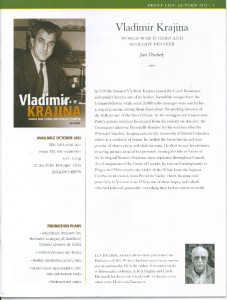
Available from http://ronsdalepress.com/books/vladimir-krajina/

